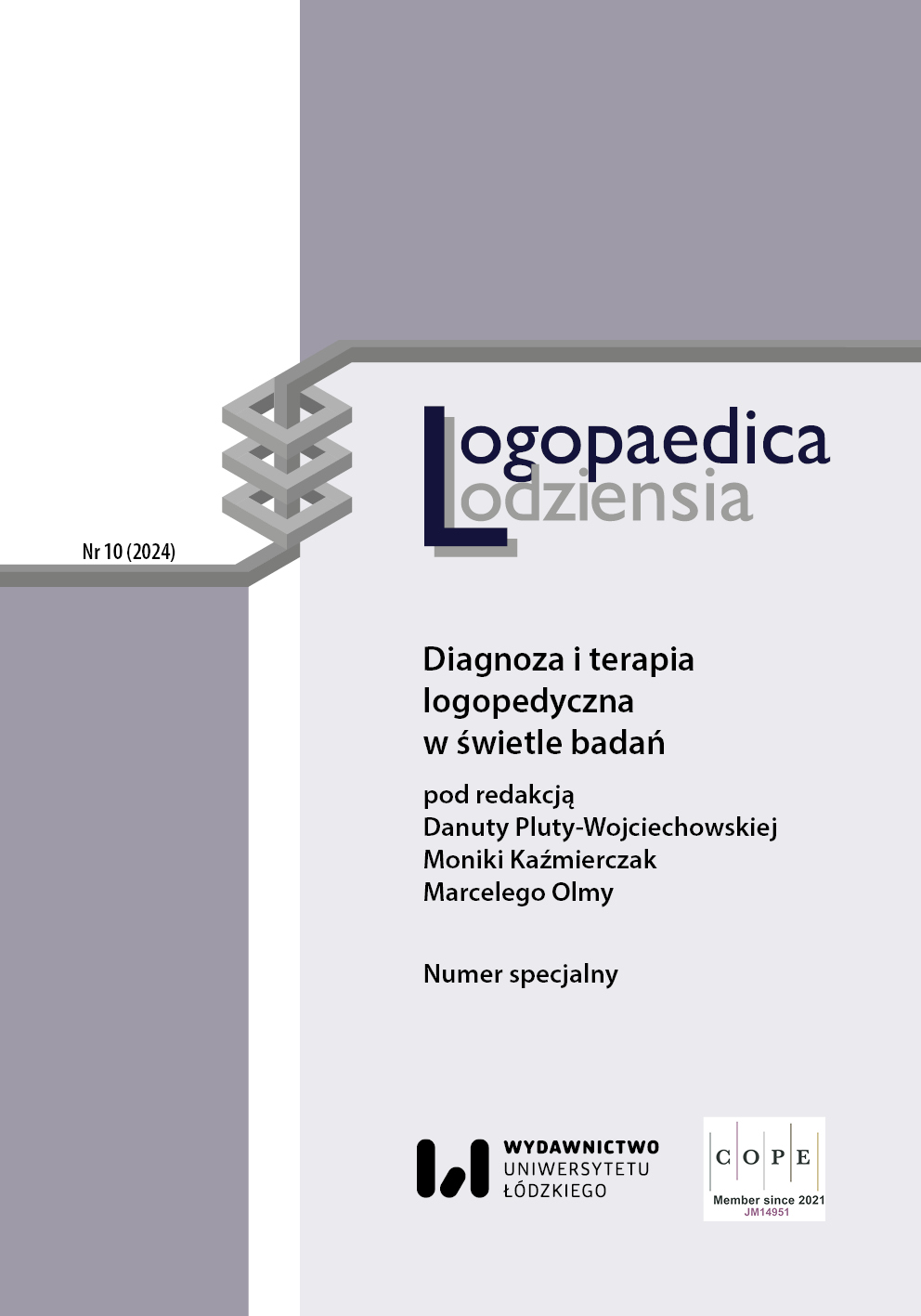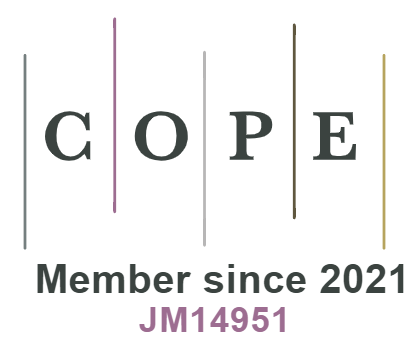Speech Therapy Transformation or Speech Therapy Boutique, Robbery and Bling? Reconnaissance of Issues
DOI:
https://doi.org/10.18778/2544-7238.10.01Keywords:
subject of speech therapy, interdisciplinarity of speech therapy, threat to interdisciplinarity, hybrid speech therapist, education of speech therapists, exceeding competences by speech therapistsAbstract
The aim of the study is to accentuate the worrisome aspects in the advancement of speech therapy. The background for reflection is the subject matter of speech therapy and the resulting interdisciplinarity of this field. In this context, the author describes some disturbing phenomena, such as speech therapists omitting speech therapy tasks and adopting the methods used by other specialists, and thus, exceeding their competences. As a result of this, speech therapists are moving away from speech therapy and the boundaries between speech therapy and medicine or physiotherapy become blurred. Another consequence is the appearance of hybrid speech therapists, i.e. those whose place can be described as being ‘between speech therapy and physiotherapy’.
Downloads
References
ASHA – American Speech‑Language Hearing Association, b.r., Evidence‑Based Practice (EBP), https://www.asha.org/Research/EBP/Evidence‑Based‑Practice/ (dostęp: 20.07.2018).
Google Scholar
Grabias S., 1997, Mowa i jej zaburzenia, „Audiofonologia”, t. 10, s. 3–20.
Google Scholar
Grabias S., 2008, Postępowanie logopedyczne. Diagnoza, programowanie terapii, terapia, „Logopedia”, t. 37, s. 13–27.
Google Scholar
Grabias S., 2012, Teoria zaburzeń mowy. Perspektywy badań, typologie zaburzeń, procedury postępowania logopedycznego, [w:] S. Grabias, Z.M. Kurkowski (red.), Logopedia. Teoria zaburzeń mowy, Lublin: Wydawnictwo Uniwersytetu Marii Curie‑Skłodowskiej, s. 15–72.
Google Scholar
Grabias S., Panasiuk J., Woźniak T., 2015, Logopedia. Standardy postępowania logopedycznego. Podręcznik akademicki, Lublin: Wydawnictwo Uniwersytetu Marii Curie‑Skłodowskiej.
Google Scholar
Kaczmarek L., 1988, Nasze dziecko uczy się mowy, Lublin: Wydawnictwo Lubelskie.
Google Scholar
Kaczmarek L., 1991, O polskiej logopedii, [w:] S. Grabias (red.), Przedmiot logopedii, seria: „Komunikacja językowa i jej zaburzenia”, t. I, Lublin: Zakład Logopedii i Językoznawstwa Stosowanego, Uniwersytet Marii Curie‑Skłodowskiej, s. 5–25.
Google Scholar
Kita M., 2012, „Razem”. Konsiliencja, interdyscyplinarność, transdyscyplinarność, [w:] M. Kita, M. Ślawska (red.), Transdyscyplinarność badań nad komunikacją medialną, t. 1: Stan wiedzy i postulaty badawcze, Katowice: Wydawnictwo Uniwersytetu Śląskiego, s. 11–30.
Google Scholar
Koczanowicz L., 2011, Interdyscyplinarność między rabunkiem a dialogiem, [w:] R. Włodarczyk, W. Żłobicki (red.), Interdyscyplinarność i transdyscyplinarność pedagogiki – wymiary praktyczny i teoretyczny, Kraków: Oficyna Wydawnicza „Impuls”, s. 35–43.
Google Scholar
Kotarbiński T., 1957, Myśli o działaniu, Warszawa: Państwowe Wydawnictwo Naukowe.
Google Scholar
Lakoff G., Johnson M., 1988, Metafory w naszym życiu, Warszawa: PIW.
Google Scholar
Łuczyński E., 2011, Rozgryzając tajniki mowy. Wiedza o języku polskim dla logopedów, Gdańsk: Wydawnictwo Uniwersytetu Gdańskiego.
Google Scholar
Michalik M., 2015, Transdyscyplinarność logopedii – między metodologiczną koniecznością a teoretyczną utopią, [w:] S. Milewski, K. Kaczorowska‑Bray (red.), Metodologia badań logopedycznych z perspektywy teorii i praktyki, Gdańsk: Wydawnictwo Harmonia Universalis, s. 32–46.
Google Scholar
Mierzejewska H., 1998, Lingwistyczne podstawy diagnozy i „terapii” logopedycznej, [w:] I. Nowakowska‑Kempna (red.), Logopedia jako nauka interdyscyplinarna – teoretyczna i stosowana, Katowice: Uniwersytet Śląski.
Google Scholar
Pluta‑Wojciechowska D., 2019, Efektywność terapii dyslalii jako kategoria badań naukowych, [w:] J. Panasiuk (red.), Logopedia jako nauka. Tom I – Przedmiot i metodologia badań, Warszawa: Państwowa Akademia Nauk, s. 201–215.
Google Scholar
Pluta‑Wojciechowska D., 2020, Logopaedics as an Interdisciplinary Science in the Eyes of Speech Therapists. Preliminary Research Results, „Logopaedica Lodziensia”, nr 4, s. 141–155.
Google Scholar
DOI: https://doi.org/10.18778/2544-7238.04.10
Pluta‑Wojciechowska D., 2022, Recenzja. Donata Oziemczuk, Monika Owsianowska, Nowe spojrzenie na wędzidełko języka u niemowląt i starszych dzieci, Wydawnictwo Stomatologia Oziemczuk, Zielona Góra 2022, ss. 144, „Logopedia”, t. 51(2), s. 299–306.
Google Scholar
Pluta‑Wojciechowska D., 2023, Dlaczego o dyslalii trzeba dziś mówić inaczej? O trzech ujęciach dyslalii w polskiej logopedii, „Logopedia”, t. 52, s. 197–226.
Google Scholar
Porayski‑Pomsta J., 2013, Logopedia w społeczeństwie komunikacyjnym, [w:] Z. Zaro, J. Porayski‑Pomsta (red.), Język i logopedia, Warszawa: Wydział Polonistyki Uniwersytetu Warszawskiego, s. 141–147.
Google Scholar
Słownik języka polskiego PWN, b.r., https://sjp.pwn.pl/ (dostęp: 4.01.2024).
Google Scholar
Downloads
Published
How to Cite
Issue
Section
License

This work is licensed under a Creative Commons Attribution-NonCommercial-NoDerivatives 4.0 International License.












